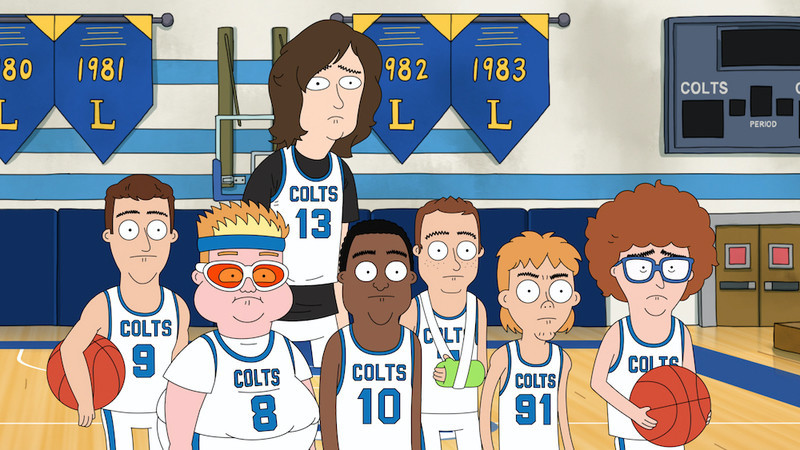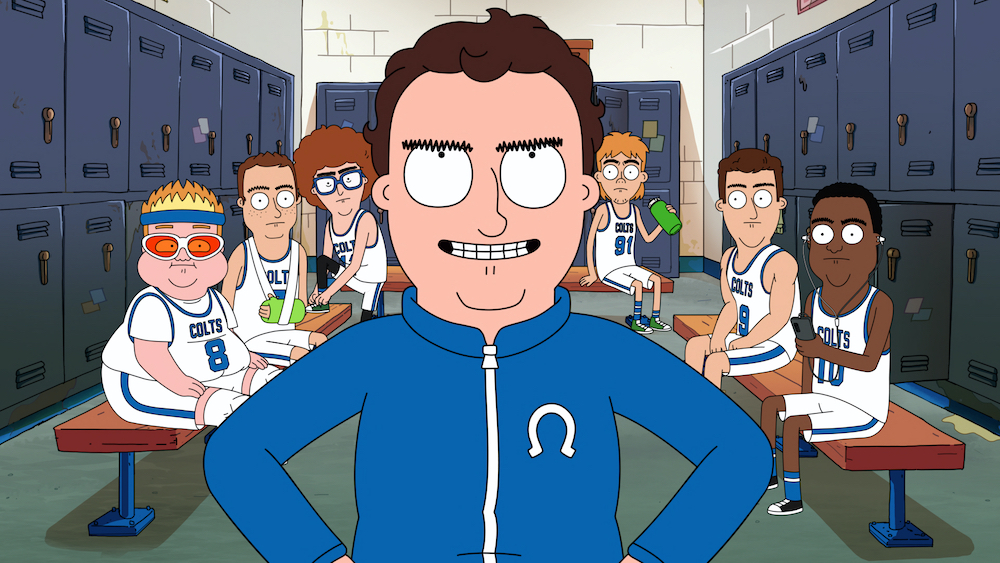There’s an entire episode of Netflix’s raunchy animated comedy “Hoops” that is dedicated to beating a literal, dead horse. It’s so fitting for a show that quickly numbs the viewer to the provocative effect of an f-bomb, and simply comes off as trying too hard to be naughty. An optimist would call this episode a cry for help from the writer’s room, but it’s more believable that the show is just blissfully unaware as to how unfunny it is, while being caught up in a tired reference. In this case, it’s “The Godfather.”
“Hoops” is about Ben Hopkins (voiced by Jake Johnson), a coarse, vulgar high school basketball coach in small-town Kentucky who has a dream of being like the real-life, actually abusive coach Bobby Knight. In a richer comedy of such caustic proportions, that bleak dream might mean a larger investigation. But “Hoops” is not concerned with a study of such white rage so much as harvesting it for alternately outrageous and sleepy shenanigans, driven by someone who swears like 10-year-olds do when they discover such words. Alas, Ben is a certifiable adult, and he shouldn’t be coaching high schoolers, as much as he thinks it will lead him to his ultimate goal—coaching the Chicago Bulls and getting an infinity pool.
Created by Ben Hoffman, “Hoops” proves that excessive cussing is just like canned laughter when it comes to comedy, in that abuse of either shows the extent of a show’s desperation. Ben’s profane outrage becomes tiresome pretty quickly into the pilot episode, and doesn’t make for much of a study for the following nine episodes that are based around Johnson’s angry character. The show just brandishes its dysfunction, like his relationship with his soon-to-be-ex-wife Shannon (Natasha Leggero), his friend Ron (Ron Funches) who is now dating Shannon, or his hotshot father (Rob Riggle), who owns a steakhouse. The closest “Hoops” goes to getting underneath Ben’s hard exterior is during plotlines about fathers and sons, but the show doesn’t have the capacity for it. It’s just another idea to show why Ben is so messed up, and essentially helpless.

The world of “Hoops” is filled with lazy characters, like a parody on a sports movie that forgets to follow through on the clever joke. Ben coaches a group of underdogs, which includes stereotypes like the fat kid, the nerd, and the redneck, and a token Black character. The easy, character-based jokes that you expect from this line-up do indeed arrive, and the one standout is Matty, a seven-foot-tall kid that Ben thinks will be his key to coaching success. When the show focuses more on them as a ragtag group—trashing the school, or trying to hang with cheerleaders during a weekend trip—it leads to more empty jokes. Especially when Ben is involved, the show is simply so inappropriate that its R-rated jokes are hardly shocking. That’s the constant experience of “Hoops,” which thinks that its generic characters and crude jokes are clever enough.
The series wants a trophy for navigating non-PC comedy with a few progressive ideas, as with another gay basketball player who gets teased for passing as straight, but it’s a weak inversion of homophobic bullying. The same goes with Opal, a principal played by Cleo King, one of the few characters of color. As much as the series has someone saying, “It’s 2020!”, “Hoops” still relegates her to the cringing line, “Ooh Ben, you nasty!”
For whatever reason that Johnson was passionate about the show (he is also an executive producer), he isn’t the right fit for the role. More than Bobby Knight, Ben is meant to replicate some kind of vulgar god like Joe Pesci or Andrew Dice Clay, and yet Johnson just doesn’t have a certain way with the f-word that can make or break such a vulgar character. Ben’s closest contemporary is more like Danny McBride’s Kenny Powers from “Eastbound and Down,” and yet that’s another example of an f-word titan who makes his cussing effortless, if not poetic. Listening to Johnson, it’s far too easy to imagine him just yelling in a recording booth, with the showrunners hoping that the script will be as funny to the larger public as it might have been during a table read.
If it’s fair to largely judge a show by its pop culture references, “Hoops” takes its tackiness to nearly experimental heights, investing its humor in whether ‘90s staples are still funny. There’s references to “Men in Black” and “The Matrix,” but also Chumbawumba’s “Tubthumper,” for the sake of making such nods. And then when it comes to the expected but always gross Netflix synergy, “Hoops” is the kind of show that finds a way to include Joe Biden and “The Kominsky Method” in the same bad joke. Then of course there’s Ben’s fixation with the movie “Little Man Tate,” which is repeated so often you can tell it’s another thing “Hoops” is trying to make stick by force. As of this posting, “Little Man Tate” is inexplicably not streaming on Netflix.
All of season one screened for review.












